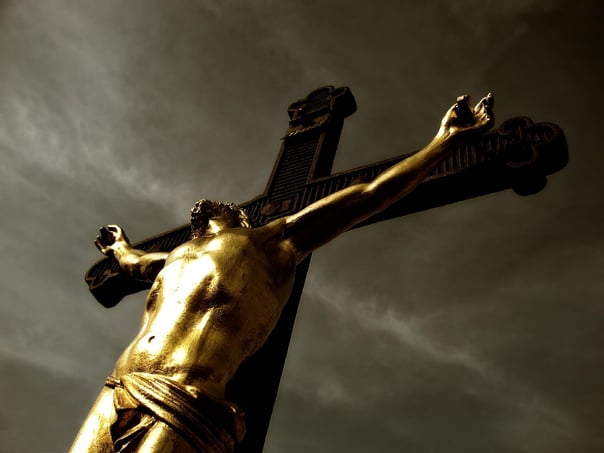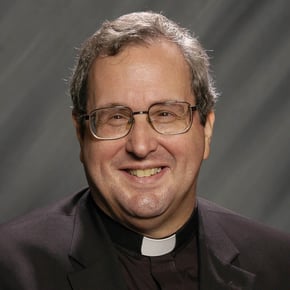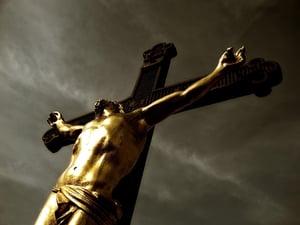In view of what has been said about the unconditional love of God and His redemption of suffering, one might ask the questions, why would God have allowed suffering to occur in the first place?
If God intends to redeem every aspect of suffering in His unconditional love, why didn’t He simply eliminate the possibility of suffering so that we could avoid pain and He wouldn’t have to redeem it?

Why not nip the entire suffering business in the bud – at the beginning of the world?
As will be seen, there are several reasons why God would allow suffering to occur in the world, but all of them, according to the Christian view, would have to be linked to the advancement of love – the free appropriation of love. Thus, if God allows human beings to cause suffering to one another, He does so (according to the Christian view) for reasons of advancing the free appropriation of love; and if God created an imperfect world with natural laws, which indirectly cause suffering, He would have done so for the same reason. If God is unconditional love (see free article – “Who is God”), He would not directly cause suffering (except to impede those headed toward imminent self-destruction), and if He allows suffering, He does so to advance love and to strengthen His invitation to eternal unconditional love.
Well, then, if God does not directly cause suffering (except to impede those headed toward imminent self-destruction), and is therefore only an indirect cause of suffering, what or who are the true direct causes of suffering? There are three major sources: two, which arise out of conditions extrinsic to our identity decisions, and one, which is related to our identity decisions. The two sources extrinsic to our identity decisions are:
- suffering caused directly by human agents (individuals or groups – e.g., Joe causes suffering to Mary, or a political regime persecutes hated minorities); and
- suffering by natural forces (e.g., tsunamis, earthquakes, draught, disease, old age, etc.).
There are many nuances and combinations of these two sources of suffering. For example, a preventable disease such as leprosy (a natural cause) is not prevented or delimited by a particular country in order that tax money can be used to incite a new war (a human cause); or a tsunami (a natural cause) hits a particular country, but the country next to it decides not to use easily accessible resources to help because the victims are thought to be troublesome or unworthy (a human cause).
Many forms of psychological suffering are attributable to such combinations. For example, a person might feel depression because of a chemical imbalance (a natural cause), which causes him to be marginalized by people who are fearful of his peculiar conduct (a human cause), which, in turn, exacerbates his depression and its physical symptoms.
The third source of suffering is a result of the intentional or unintentional decisions we make about our identity, purpose in life, and happiness along the stages of life’s way (e.g., a comparative identity or a contributive identity; a decision to be fundamentally autonomous or interpersonal; etc.). These identity decisions define happiness and life purpose for us, and those definitions, in turn, determine whether we believe ourselves to be happy or unhappy, purposeful or unpurposeful, worthwhile or unworthwhile, etc.
We have already seen the unhappiness that can come from dominant Level 2 happiness – emptiness and the comparison game, and we have also seen the unhappiness that can come from rejecting transcendent happiness (Level 4) – cosmic emptiness, loneliness, alienation, and guilt (see free article – “Escaping Your Personal Hell”).
According to Jesus, God does not want anybody to suffer. Indeed, He should be likened to the most compassionate and affectionate of parents (Abba – the father of the Prodigal Son), who would gladly suffer in the place of his/her child, but realizes that this child must make her own decisions and must deal with the challenges of life as a free human agent. God suffers with everyone who suffers, and God intends to redeem every scintilla of suffering in His providence for all eternity.
Indeed, God the Father sent His only begotten Son into the world to suffer with us and for us – so that He could be a companion with us in our suffering and bring us to our eternal salvation. God may allow suffering to occur in the world (for the reasons mentioned below), but His intention is to transform it into love. If He does not do this now, He might do it later; if He does not do this later in this world, He may do it in the eternal world, which is to come. The key idea to remember is that God has an eternal perspective, and that He will transform all suffering into love for all eternity.
Thus, there can be no suffering, which is completely tragic. Tragedy may exist for a while, but in the hands of God, it will eventually be turned into love, and that love will last for all eternity. Even incredible tragedies, like the death of a child, are not ultimately and completely tragic, they are only partially and temporally tragic, for the temporary loss and grief that parents would feel in such circumstances is already compensated in the life of the child by God bestowing unconditional love upon him or her in His heavenly kingdom (see the free article – “Suffering, Love, and Eternal Life”).
Yes, God feels the grief of the loving parents who miss their beloved, and He will feel that grief for as long as the parents experience it; but God simultaneously bestows unconditional and eternal love and fulfillment on the child whose loss is the cause of that grief.
Therefore, in the Christian view, suffering is complex. It includes the genuine experience of deep grief at premature loss. It also includes an experience of faith or hope that God is already bestowing unconditional love upon this child. It also includes an experience of trust that one will be reunited with that child in the eternity of God’s unconditional love; and it also includes an experience of “peace beyond all understanding” (from the Holy Spirit) intimating that everything is going to be all right.
This mixture of thoughts and emotions can be quite confusing and even trying for a person of faith, because one might feel guilt about experiencing this sense of peace (from the Holy Spirit) when one “should” be experiencing the terrible loss of the beloved. One might believe that one’s faith in being reunited with one’s child for all eternity should not mitigate the terrible “injustice” of having that child taken prematurely (even if the child were taken by human evil or purely natural causes).
The important point for Christians to remember is that God expects us to feel all these emotions in all of their complexity throughout a prolonged period of grieving. It is therefore important for us not to let one feeling become more important or authentic than another so that the “more authentic one” mitigates or cancels the “less authentic one.”
Christians need to experience “grief – profound loss – hope in unconditional love – hope in eternal reuniting – peace beyond all understanding” all at once, in all its complexity, unmitigated, until Unconditional Love can make transparent sense of it all. This is an incredibly hard thing to do; yet it is a path to the transformation of suffering into love, and therefore a path into the horizon of Unconditional Love’s eternity.
Saint Paul expresses this very hope for the redemption of suffering not only for us, but also for the whole of creation through us, in a remarkable passage from the Letter to the Romans:
I consider that the sufferings of this present time are not worth comparing with the glory that is to be revealed to us. For the creation waits with eager longing for the revelation of the sons of God; for the creation was subjected to futility, not of its own will but by the will of Him who subjected it in hope; because the creation itself will be set free from its bondage to decay and obtain the glorious freedom of the children of God. We know that the whole creation has been groaning in travail together until now; and not only the creation, but we ourselves, who have the first fruits of the Spirit, groan inwardly as we wait for adoption as sons, the redemption of our bodies. For in this hope we were saved. Now hope that is seen is not hope. For who hopes for what he sees? But if we hope for what we do not see, we wait for it with patience. Likewise the Spirit helps us in our weakness; for we do not know how to pray as we ought, but the Spirit Himself intercedes for us with sighs too deep for words. And He who searches the hearts of men knows what is the mind of the Spirit, because the Spirit intercedes for the saints according to the will of God. (Romans 8:18-27)
I present the above overriding principle because I am concerned that the reader might think that the forthcoming presentation about why God might permit suffering is a bit too philosophical, too cold, too detached from the real emotion and sadness of suffering. I do not intend this at all. I do not want to distract the reader from the pathos intrinsic to suffering.
I do not want to present a detached philosophical view of suffering. I merely want to give a sense of the logical parameters, which might surround the necessity for God to permit the possibility of suffering induced by human and natural causes. I beg the reader’s indulgence to grant me the above overriding principle as I do so.
With this in mind, we may now proceed to the two major extrinsic causes of suffering – and why God would allow them to occur.

